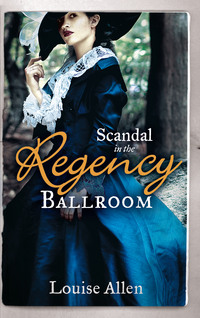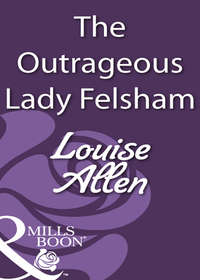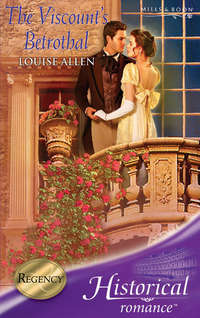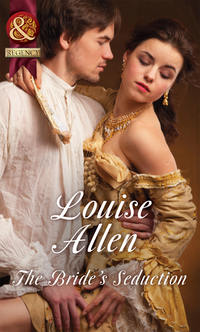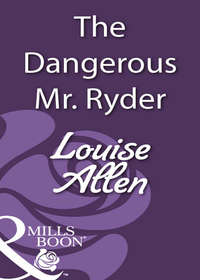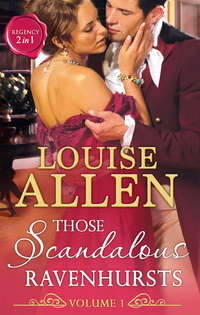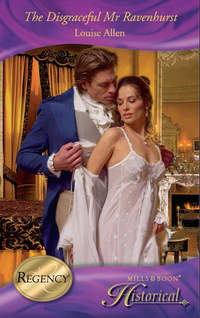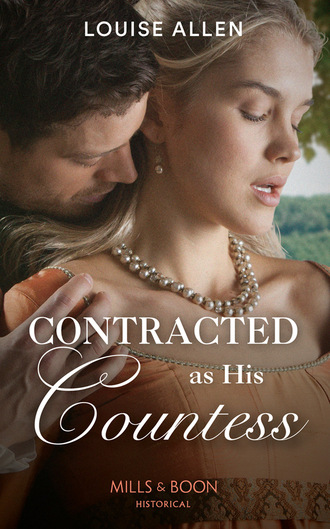
Полная версия
Contracted As His Countess

From a recluse secluded in a castle…
…to his countess!
Cloistered away in a castle since birth, Madelyn Aylmer must now fulfill her eccentric father’s dying request: wed nobleman Jack Ransome! She has what Jack needs—land—and so he accepts their marriage of convenience and vows to introduce this sheltered innocent to society. But what Madelyn hadn’t expected was the way her body reacts to Jack, especially to his promise of a union filled with unbridled passion!
LOUISE ALLEN loves immersing herself in history. She finds landscapes and places evoke the past powerfully. Venice, Burgundy and the Greek islands are favourite destinations. Louise lives on the Norfolk coast and spends her spare time gardening, researching family history and travelling in search of inspiration.
Also by Louise Allen
Marrying His Cinderella Countess
The Earl’s Practical Marriage
A Lady in Need of an Heir
Convenient Christmas Brides
Least Likely to Marry a Duke
Lords of Disgrace miniseries
His Housekeeper’s Christmas Wish
His Christmas Countess
The Many Sins of Cris de Feaux
The Unexpected Marriage of Gabriel Stone
Discover more at millsandboon.co.uk.
Contracted as His Countess
Louise Allen

www.millsandboon.co.uk
ISBN: 978-1-474-08958-6
CONTRACTED AS HIS COUNTESS
© 2019 Melanie Hilton
Published in Great Britain 2019
by Mills & Boon, an imprint of HarperCollins Publishers 1 London Bridge Street, London, SE1 9GF
All rights reserved including the right of reproduction in whole or in part in any form. This edition is published by arrangement with Harlequin Books S.A.
This is a work of fiction. Names, characters, places, locations and incidents are purely fictional and bear no relationship to any real life individuals, living or dead, or to any actual places, business establishments, locations, events or incidents. Any resemblance is entirely coincidental.
By payment of the required fees, you are granted the non-exclusive, non-transferable right and licence to download and install this e-book on your personal computer, tablet computer, smart phone or other electronic reading device only (each a “Licensed Device”) and to access, display and read the text of this e-book on-screen on your Licensed Device. Except to the extent any of these acts shall be permitted pursuant to any mandatory provision of applicable law but no further, no part of this e-book or its text or images may be reproduced, transmitted, distributed, translated, converted or adapted for use on another file format, communicated to the public, downloaded, decompiled, reverse engineered, or stored in or introduced into any information storage and retrieval system, in any form or by any means, whether electronic or mechanical, now known or hereinafter invented, without the express written permission of publisher.
® and ™ are trademarks owned and used by the trademark owner and/or its licensee. Trademarks marked with ® are registered with the United Kingdom Patent Office and/or the Office for Harmonisation in the Internal Market and in other countries.
www.millsandboon.co.uk
Version: 2020-03-02
MILLS & BOON
Before you start reading, why not sign up?
Thank you for downloading this Mills & Boon book. If you want to hear about exclusive discounts, special offers and competitions, sign up to our email newsletter today!
SIGN ME UP!
Or simply visit
signup.millsandboon.co.uk
Mills & Boon emails are completely free to receive and you can unsubscribe at any time via the link in any email we send you.
Note to Readers
This ebook contains the following accessibility features which, if supported by your device, can be accessed via your ereader/accessibility settings:
Change of font size and line height
Change of background and font colours
Change of font
Change justification
Text to speech
For AJH for being a rock.
Contents
Cover
Back Cover Text
About the Author
Booklist
Title Page
Copyright
Note to Readers
Dedication
Author Note
Chapter One
Chapter Two
Chapter Three
Chapter Four
Chapter Five
Chapter Six
Chapter Seven
Chapter Eight
Chapter Nine
Chapter Ten
Chapter Eleven
Chapter Twelve
Chapter Thirteen
Chapter Fourteen
Chapter Fifteen
Chapter Sixteen
Chapter Seventeen
Chapter Eighteen
Chapter Nineteen
Chapter Twenty
Chapter Twenty-One
Chapter Twenty-Two
Extract
About the Publisher
Author Note
An interest in a revived Gothic style, harking back to the pointed arches and rich ornamentation of the Middle Ages, developed in the later eighteenth century as an element of the Romantic movement and as a reaction to the cool perfection of the Classical style.
Horace Walpole’s Gothic revival Strawberry Hill House in Twickenham was begun in 1749. William Thomas Beckford, the wildly eccentric art collector and author of Gothic novels, built his Fonthill Abbey—an enormous mansion in the style of a medieval abbey—between 1796 and 1813, and landowners began to litter their grounds with follies resembling ruined castles or monasteries.
I have based Madelyn’s father, Peregrine Aylmer, on some of the more eccentric Gothic enthusiasts of the time, although he would probably have had most in common with the Thirteenth Earl of Eglinton, whose wildly ambitious Eglinton Tournament cost him between thirty and forty thousand pounds in 1839. Despite the contestants training with lances for up to a year beforehand, the tournament was widely mocked and suffered from dreadful weather.
More soberly, the Gothic style flourished in the Victorian age as the most ‘suitable’ style for churches, and was the chosen architecture for both the rebuilt Houses of Parliament—completed 1870—and Tower Bridge—1894.
Peregrine Aylmer would have approved of both, I am certain.
Chapter One
Castle Beaupierre, the Kent countryside—10th July, 1816
Jack Ransome reined in his horse on the crest of the rise and looked down at a vision of the fourteenth century transported to the age of the Hanoverians. England was still littered with castles, large and small. Some were ruins, some were converted long ago into more or less comfortable houses, but none still fulfilled the function for which they had been built. Except, apparently, this one.
It helped, of course, if you were wealthy and more than slightly eccentric as the late Peregrine Aylmer had been. Then you could pour thousands of pounds and a lifetime of scholarship into creating your fantasy world.
Castle Beaupierre seemed to bask as it lay in the sunshine that reflected off the polished slate of the roofs, the walls of creamy, perfect stone. Jack tried to estimate the cost and time involved in cleaning and repairing those walls and roofs and failed utterly.
From the centre tower a great black flag stirred and lighter pennants fluttered, red and blue and gold, around it. The encircling moat, full of water, was home to perhaps a dozen swans gliding in pristine white formation past the drawbridge. Which was raised.
‘She invited me, Altair,’ Jack observed. The big black gelding flicked one ear and then cocked a hoof comfortably, settling down to wait. ‘The least she could do is lower the drawbridge. Perhaps I am supposed to send a page over in a rowing boat or have a herald trumpet my arrival. What is the etiquette for calling on people deluded enough to live in the Middle Ages?’
He gathered up the reins and sent the horse on at a walk down the slope towards the fairy-tale building. When they were halfway there the drawbridge began to creak slowly downwards until it reached his side of the moat with a dull thud. Someone was watching.
‘Which leaves me faced with a portcullis,’ Jack muttered. ‘What is the matter with the woman? Her father was the lunatic who wanted to play knights in armour and he’s been dead for almost a year.’ Hence, he supposed, the black flag. As he spoke there was a rattle of chains from inside the walls and the wood and iron grid creaked upwards.
Now, faced with vast double oak doors studded with sufficient metal knobs to repel a charging elephant, Jack felt both amusement and patience slide away. ‘I should have brought siege engines, obviously. If Mistress—Mistress, if you please!—Madelyn Aylmer wants me then she can open her confounded gates because I am not going to knock. I did not drag down to Kent in the middle of the Newmarket July race meeting to play games.’ He clicked his tongue at Altair, who stepped on to the bridge, pecked at the sudden hollow note under his hooves, then walked on. Finally, the great doors opened.
The shadows were deep as Jack rode through the high archway, the sunlight blinding in the courtyard beyond a second opening. Here he was in the killing ground, where attackers could be penned in and assaulted on all sides from above, and he felt a prickle of awareness run down his spine as he rode towards the light. Someone was watching him. Jack circled the horse and looked up and back to a window high in the wall, making no attempt to disguise his scrutiny. A flicker of white, the pale oval of a face, the flash of spun gold and the watcher was gone.
Serve her right if I keep going right back where I came from.
But this was a commission, which meant money, and at least Mistress Aylmer hadn’t expected him to dress up in medieval clothes for this meeting. Pride was all very well, but it was a hollow coin that bought neither bread nor horseshoes. Jack turned Altair back and rode into the courtyard where, finally, someone had come out to meet him.
It was a surprise that the servants were not dressed in tights and tabards, although the leather jerkin and breeches of the groom who took Altair’s reins and led him away had a timeless look to them and the black-coated individual who came forward could have come from any period in the past hundred years.
‘My—’
‘Mr Jack Ransome to see Miss Aylmer, by appointment.’
‘Mistress Madelyn will receive you in the Great Hall,’ the man responded with the same emphasis Jack had used and without a flicker of either amusement or annoyance. ‘This way, sir.’
Jack followed up stone steps, along passages hung with tapestries that glowed as bright, surely, as the day they had been made. Which was probably within the last twenty years, he reminded himself with a flash of cynicism. He suspected that appearances were all in this fantasy world.
The butler, if that was who he was, threw open double doors—more studded oak, of course—and stood aside for Jack to enter. They closed behind him with a dull thud.
The Great Hall was well named. Walter Scott would love it, Jack reflected. All it needed was a bearded bard in one corner reciting The Lay of the Last Minstrel. He preferred something with fewer draughts and more soft furnishings himself. The roof was a hammer-beam construction and he counted two, no, three fireplaces of the ox-roasting variety, sighed at the sight of a number of suits of armour and walked on past more tapestries.
At least there are no harps and minstrels…
At the far end was a long oak table that looked as though it had been built to support the ox once it had been roasted. On it was a carved wooden coffer. And there, standing behind the coffer, was a tall, slender figure in blue. The light from a high window caught golden sparks from her hair—the watcher at the gate, he guessed.
Jack walked towards his new client, boot heels striking on stone flags, the rushes that were strewn over the floor rustling as he went. The place must be an ice house in the winter, even with all the fires alight—and most of the heat would go straight up the chimneys. The local coal merchants must be rubbing their hands with joy.
Presumably Miss Aylmer thought to put him at a disadvantage by making him walk towards her for this distance. Jack kept a straight face and an easy pace and only produced a social smile when he was within six feet of the table. Strangely, now he was inside and had sight of his client, he felt his irritation increase.
Not that the woman in front of him was unpleasing to the eye, even if her appearance was decidedly unusual. She was wearing a gown of deep blue in some fine draped fabric, caught in under the bust with tightly intricate pleating at the front. The long sleeves belled out over her hands to the knuckles where the hems were embroidered with delicate floral work that matched the band beneath her breasts.
Gowns might be worn with a high waistline now, but this was quite definitely not a modern style. Nor would any woman over the age of fifteen wear her hair loose around her shoulders, and Miss Aylmer must be in her early twenties. The straight fall of pale gold was caught back with combs but otherwise unconfined, signalling, he assumed, her virginity. Some men might see that as a challenge, others as an affectation. Jack told himself to withhold judgement. The woman in front of him was, after all, about to offer him employment and mildly exasperated incomprehension was no reason to turn it down. He could always do with money.
‘Miss Aylmer.’
‘Lord Dersington.’ She did not smile or offer her hand. Her eyes were the blue-grey of a winter river in her pale face.
Jack found himself oddly short of breath. She was not pretty, or beautiful, but she had something…something he could not put a name to. An ethereal quality, a cool serenity as though she was looking through glass into another world. He thought of stone carvings of female saints he had seen in cathedrals. She had the same rather long nose and oval face and those eyes that looked tranquilly on the horrors of the world of sinners. Plain by modern standards, yet somehow lovely and utterly remote.
‘Will you not take a seat?’

He did not call himself by his title, Madelyn knew that, but it was important to see how he took aggravation. Well, it seemed, on the surface at least. She folded her hands demurely in front of her and willed them not to shake. ‘My lord—’
‘Jack Ransome,’ said the Fifth Earl of Dersington, perfectly pleasantly, as he pulled out a chair and waited for her to sit before he took it, three feet away across the board. ‘Simply Mr Ransome.’ He put his hat and gloves on the table and ran one hand through ruffled hair the colour of the ancient oak panelling in the castle’s dining room.
‘Why do you not use your title, sir?’
‘Because, as I am sure you are aware—unless you made no enquiries about me at all, which I cannot believe—I have neither lands, nor seat. What is an earl without land?’ He asked the question as though they were debating an academic point, not something so personal to him. But the blue eyes were unamused.
‘A landless earl is still an earl.’ It felt like pushing a chess piece forward. How would he respond?
‘The entire raison d’être of earls, and of all the rest of the aristocracy, was to support the Crown, to maintain retainers so they could put men in the field to fight. Of recent years the role has been one of governance and of economics. Men of title sit in the House of Lords to assist in the government and they contribute to the wealth of the country by the stewardship of its lands. I have no lands and therefore no retainers and no wealth. Therefore no power and, logically, no function as an aristocrat.’
‘You could still sit in the House of Lords,’ Madelyn pointed out, even more curious now she had heard the explanation from his own lips. They were firm lips, framing a mouth that did not seem designed for hesitation.
‘I choose not to waste my time in a place where I can only pretend to have a function. You may consider it pride, Miss Aylmer, and you may be right. My peers call me John Lackland, which conveys the measure of their lack of respect for my position, would you not say? I prefer to spend my time and energies on what I can achieve.’
‘King John lost all the English lands in France to earn the title Lackland. As far as I am aware you did nothing to deserve losing your birthright.’ She was used to dealing with difficult men and she had steeled herself to confront this one. He was not going to make her stop probing until she understood who she was dealing with—there was too much at stake.
‘No,’ he agreed. ‘But that does not make me any less inclined to carry on as though I command rolling acres. I prefer reality and I dislike fantasy.’ Madelyn noticed that he did not glance around as he said it: clearly he expected her to be able to take his point. It seemed he despised her father’s creation.
‘I chose to make my own place in the world by my own efforts,’ Jack Ransome continued. ‘And I assume that is why you have summoned me, rather than to hold a discussion about my landholdings. Or lack of them.’
Best to stop probing before he got up and walked out on her, Madelyn concluded. Or loses his temper. She smoothed out a crease in the fabric across her knee until her fingers were steady and made herself continue. ‘You are an enquiry agent.’ She knew that, of course, but she was interested in how this man described himself.
‘I act on behalf of others, for payment. I cause things to happen, or I prevent them happening. Often that involves making enquiries,’ he said. The level, dark blue gaze held neither resentment nor impatience, but neither did he show pleasure at the invitation to talk about himself. A novelty in itself… He was intriguing and that helped steady her nerves.
‘If sons find themselves entangled with unsuitable women or being bear-led by some sharp, I disentangle them. If the suitor for a daughter’s hand seems just too good to be true, I establish his bona fides. If sensitive correspondence goes missing, or anonymous letters arrive, I’ll get to the bottom of it for you. If you want a safe escort somewhere, I will provide it. If you wish to disappear, I can arrange that. Or perhaps you are being blackmailed. I remove blackmailers.’
She wondered if she was supposed to ask how he removed them. Or where to. Madelyn resisted the temptation. She needed none of those services.
Mr Ransome leaned back in the chair, crossed one booted leg over the other and raised an interrogative dark brow. ‘And what do you want me to do for you, Miss Aylmer?’
Madelyn found she was not ready to tell him yet. She needed to find the courage first. Or perhaps she needed to bury her doubts about her father’s will even deeper. Her conscience was troubling her. ‘You know who I am, who my father was, why I live in a castle?’ she asked.
She sensed rather than saw that she now had his full attention: he had studied his brief, it appeared. ‘Your father, Mr Peregrine Aylmer, was obsessed with two things, the Middle Ages and his lineage, not necessarily in that order. He inherited a large fortune and used it to restore this castle in order to create and immerse himself in a fantasy world which, I gather, he could well afford to do, given the size of his inheritance and, no doubt, his successful investments. He has recently died and you are his sole heir.’
‘Yes, that is all correct. There are no men of our name left. It derives from the Anglo-Saxon aethelmaer, which means famous noble. Our lineage stretches back beyond any recorded English kings, beyond any title of nobility surviving today.’
‘All families, even the humblest, could be traced to the beginning of time if only the records existed,’ said the man whose rejected title was a Tudor creation. She suspected that she knew the details of his family tree far better than he did. He shrugged. ‘We all go back to Adam. Some know more about their history—or the fantasies about it—than others, that is all.’
‘Our lineage is documented. All my father wanted was a son to hand the name down to, to continue the line, to continue his work. My mother died along with my infant brother six years ago. I have proved to be the only survivor of seven infants from two wives. He lost heart at that death.’
‘Is that when the obsession with this castle became intense?’ Ransome enquired coolly.
‘He was not obsessed,’ she protested. Father had been right, she had to believe that. Everyone was prejudiced against him. Even me, sometimes, she thought guiltily.
She had meant to rattle Jack Ransome’s composure, but it seemed he had turned the tables on her. Madelyn lowered her voice, forced herself into her habitual calm. ‘Castle Beaupierre is a work of great scholarship, an artistic creation, bringing a lost world back. My father’s entire life was dedicated to that.’ Surely anyone could see it? Even she, knowing the cost, had no doubts about the results, and Jack Ransome was an educated man: he would understand what it had cost in time and money and devotion.
‘And were you a work of scholarship, a piece of art, to your father, Miss Aylmer?’
I was a disappointment. A girl. Of course I was not a piece of art. I was… I am…a failure.
‘I naturally supported my father. He chose to live in an age of chivalry and beauty. A world set in the countryside of England, a world of craftsmanship. Not in a modern world of steam and speed and cities, of poverty and ugliness.’ She knew all the arguments by rote.
‘I see.’
It was clearly a polite lie. The face of the man opposite her was set in a severe expression that probably hid either a sneer or a desire to laugh. The fine lines in the corners of his eyes made her think that laughter was a possibility. She had no desire to be a source of amusement to him—in fact, she dreaded it, although not as much as she feared his anger. There was so much to be frightened of, but she was not going to give way now.
Madelyn controlled her breathing and made herself look steadily at Jack Ransome. Every report of him praised his intelligence, none spoke of irrational temper or violence, of ill-treatment of servants—not that he had many—or of either drunkenness or debauchery. He was in good health, a sportsman, which no doubt accounted for the breadth of his shoulders and the muscles revealed by tight breeches. He had turned his back on society, and in return society mocked him as Lackland or disapproved vehemently of his rejection of his title. But many of its members turned to him when they needed his help. He had friends, some unconventional by all reports, some very shady indeed.




